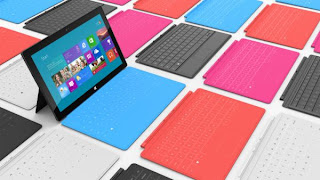Friday, 5 April 2013
Windows RT Is Failing To Win Market Share
As Microsoft gears up to officially launch its Surface RT tablet in Russia and Singapore this week, moves by a number of its hardware partners to discount their own Windows RT devices suggest that the operating system is failing to gain a foothold in the market and that consumers are not interested.
A stripped down version of Windows 8, Windows RT was developed to run on the ARM chip architecture associated with low-powered mobile devices such as smartphones and tablets. Conceived as a direct competitor to Google's Android and Apple's iOS operating systems, Windows RT mimics the look and feel of Windows 8 but is incapable of running full Windows applications or indeed legacy apps.
In fact it is only capable of running apps from the RT section of the Windows App Store. Android and iOS have similar limitations, but both platforms boast over 500,000 apps each and counting, whereas there were still only a mere 10% of that total -- 50,000 RT compatible apps -- available to Microsoft consumers as of the end of March.
Microsoft officially launched the Surface RT tablet in October 2012 and it has been on sale, primarily via its own website and retail stores, since November. Following the launch, a number of other devices from Dell, Lenovo, Samsung and Asus, among others, have come to market that use the same operating system. However, this week, Computerworld journalist Agam Shah noted that each of those companies started to heavily discount its tablets, convertibles and hybrid devices that use the operating system, suggesting that there is a serious lack of demand for the platform among the public.
In its March report into the state of the global tablet market, IDC noted that its figures suggest the Microsoft RT gamble is not paying off.
"Microsoft's decision to push two different tablet operating systems, Windows 8 and Windows RT, has yielded poor results in the market so far," said Tom Mainelli, Research Director, Tablets.
"Consumers aren't buying Windows RT's value proposition, and long term we think Microsoft and its partners would be better served by focusing their attention on improving Windows 8. Such a focus could drive better share growth in the tablet category down the road."
The fact that, after contributing next to nothing to the evolution of the personal computing market for the best part of a decade, Microsoft decided to squeeze 10 years of innovation into one year hasn't helped matters either.
In 2012, Microsoft launched a new smartphone operating system; a new PC operating system with a completely new type of touch interface; a tablet operating system that on the surface appears identical to the PC operating system though in reality isn't; two new app stores; and two tablets that look identical but are totally different; and started to offer its Kinect motion sensing system for the Windows operating system as well as for its Xbox games console.
This rush of products has clearly caused confusion in the market among resellers as well as consumers, as Nicole Kobie highlighted in the PC Pro blog on Thursday. She listed a number of Windows RT devices currently on sale on the UK, each of which was incorrectly ladled as running the full version of Windows 8. If the vendors can't get it right, how is the average consumer expected to make the right choice?
Since IDC published its report on March 12 Microsoft has launched the Surface RT tablet in a number of new territories including Japan, Mexico, New Zealand and Taiwan as well as the aforementioned Russia and Singapore and in each instance has retained the same pricing model -- US$499 (RM1,528.94) for the entry-level 32GB model.
However, this week, Dell slashed US$50 (RM153.20) off its XPS 10 32GB model and a huge US$100 (RM306.40) off the 64GB model. Lenovo has dropped the asking price for its IdeaPad Yoga 11 from US$799 (RM2,448.14) to US$599 (RM1,835.34), while Samsung has announced that it is withdrawing its RT tablet, the Ativ Tab, from all non-Asian markets due to lack of demand.
This doesn't mean that the Windows Surface RT tablet is a poor device, but at the moment it cannot compete with similar tablets from Apple, Google or even Amazon in terms of price or choice of apps. The only area in which it can beat the competition is in access to the Microsoft Office suite of products, which are currently unavailable as apps on either the iOS or Android platforms. - ©AFP/Relaxnews 2013
Subscribe to:
Post Comments (Atom)

No comments:
Post a Comment